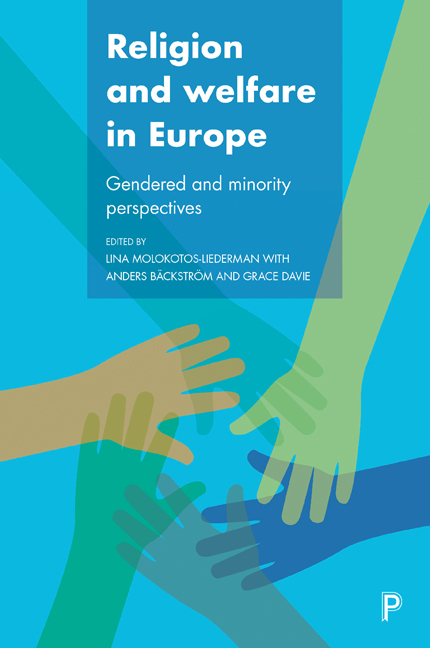Book contents
- Frontmatter
- Contents
- List of tables, figures and maps
- Acknowledgements
- Notes on contributors
- one Introduction
- Part One Thinking methodologically: approaches to research and practice
- Part Two Thinking regionally: key case studies in welfare and religion in Europe
- Part Three Gendered and minority perspectives
- Part Four Drawing the threads together
- Appendix: the WaVE team
- Index
Nine - Striving to live the good life: the tension between self-fulfilment and family obligations for women in northern England
Published online by Cambridge University Press: 05 April 2022
- Frontmatter
- Contents
- List of tables, figures and maps
- Acknowledgements
- Notes on contributors
- one Introduction
- Part One Thinking methodologically: approaches to research and practice
- Part Two Thinking regionally: key case studies in welfare and religion in Europe
- Part Three Gendered and minority perspectives
- Part Four Drawing the threads together
- Appendix: the WaVE team
- Index
Summary
Valuing the good life
Overarching quantitative studies, such as the World Values Survey, consistently show that for a majority of men and women in the advanced industrialised societies of the western world, values that are upheld as important are focused not merely on survival, or even on improvement of material living conditions, but on living the ‘good life’. However, as Ronald Inglehart and Christian Welzel's cultural map of the world (formed from data from the World Values Survey) shows, there is considerable international variation in the priority given to particular values (Inglehart and Welzel, 2005). By extension, it is reasonable to assume that variations in conceptions of what the good life is also appear within national contexts and have to be negotiated by individuals in the day-to-day decisions that they make.
Also using data from the World Values Survey, Thorleif Pettersson and Yilmaz Esmer analysed the case of Sweden, considering the implications (both for individual migrants and for the development of Swedish culture) of the differences between the dominant values in Sweden and those that prevail in the countries from which many migrants come. They note not only that there are clear differences, but also that these differences may have a significant impact on how migrants adapt to the new culture (Pettersson and Esmer, 2005). Following an analysis of the extent to which international migration from Islamic countries to western Europe influences the values systems of the migrants, Pettersson and Esmer conclude that such migration has different consequences for different aspects of the migrants’ value systems. Therefore, it is an oversimplification to say that migrants either completely hold fast to the values of their old culture or adopt entirely those of the new (Pettersson and Esmer, 2005, p 35). With this in mind, it is interesting to investigate further which elements of value systems might be particularly difficult for members of minority communities to negotiate in relation to living the ‘good life’. In this chapter, however, the focus is on Britain rather than Sweden.
Susan Pickard has identified two competing discourses of the ‘good life’ evident in contemporary Britain that, she argues, the individual has to negotiate (Pickard, 2010, p 472).
- Type
- Chapter
- Information
- Religion and Welfare in EuropeGendered and Minority Perspectives, pp. 185 - 206Publisher: Bristol University PressPrint publication year: 2017



